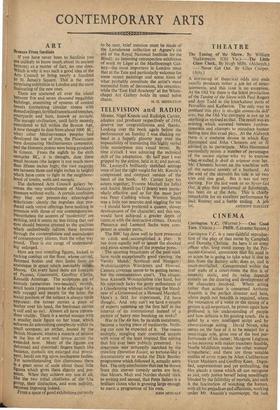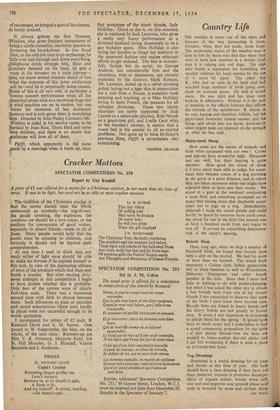CINEMA
Carrington V.C. (Warner.)—One Good Turn. (Odeon.)—Phffft. (Leicester Square.)
Carrington V.C. is a near-faithful reproduc- tion of the play of that name by Campbell and Dorothy Christie. Its hero is an army officer who, long owed money by the Pay- master-General, announces that his need is so acute he is going to take what is due to him from the Battery safe; does so, and is court-martialled. Concentrated within the four walls of a court-room the film is of necessity static, and its value depends entirely on the drawing and development of the characters • involved. Where acting rather than action is concerned Anthony Asquith is the perfect director and here, where depth not breadth is required, where the intonation of a voice or the timing of a gesture is all-important, he proves again how profound is his understanding of people and how delicate is his guiding touch. He is aided by a very intelligent script and by above-average acting. David Niven, who seems on the face of it to be miscast for a semi-tragic role, gives one of the best per- formances of his career; Margaret Leighton as his neurotic wife makes treachery feasible, Noelle Middleton makes 'the other woman' sympathetic; and there are three notable studies of army types by Allan Cuthbertson Victor Maddern and Geoffrey Keen. Digni- fied, unpretentious and yet enthralling, the film pleads a cause which all can recognise as just, only justice herself being unwillingly blinded by the fallibility of mortals, and such is the fascination of watching the human, with all his prejudices and affections, working under Mr. Asquith's microscope, the lack
of movement, so integral a part of the cinema, .1s barely noticed.
It always grieves me that Norman Wisdom, who gives frequent intimations of being a subtle comedian, resolutely persists in favouring the knockabout. In One Good Turn, as the odd-job man in an orphanage, he falls over and through and down everything. Telephone cords strangle him, flour and crockery descend on his head, he gets a wasp in his trousers on a train journey— alas, we know several minutes ahead of him what the outcome of this latter misfortune will be—and he is perpetually being chased. Some of this is all very well, in particular a riotous concert performance when all the theatrical props such as a revolving stage and a wind machine are set in motion, but one thirsts for moments of less exuberant humour and is only given them in tantalising sips. Directed by John Paddy Carstairs, Mr. Wisdom is aided in his resolve rarely to be vertical by Joan Rice, Thora Hird and some nice children, and there is no doubt that audiences will love all of them.
Phffft, which apparently is the noise made by a marriage when it busts up, stars that prototype of the dumb blonde, Judy Holliday. Good as she is, on this occasion she is outshone by Jack Lemmon, who gives a really very funny performance as a divorced husband trying desperately to be a gay bachelor again. Miss Holliday is also trying her hardest to forget her husband in the approved fashion and makes reluctant efforts to ,get seduced. The film is wonder- fully foolish but its script, by George Axelrod, has considerable brio and the situations, trite in themselves, are cleverly exploited by the director, Mark Robson. Mr. Lernmon, dolled up in a velvet smoking jacket, laying out a tiger skin in preparation for a visit from a floozie, is somehow both amusing and touching, as is Miss Holliday trying to learn French, the panacea for all unhappy divorcees. These two idiotic charmers are nobly supported by Jack Carson as a smart-alec playboy, Kim Novak as a good-time girl, and Luella Gear who, as the heroine's mother, is certain that a round bed is the answer to all ex-marital problems. Not quite up to Miss Holliday's previous films, Pl;ffft is nevertheless very entertaining.
VIRGINIA GRAHAM



































 Previous page
Previous page